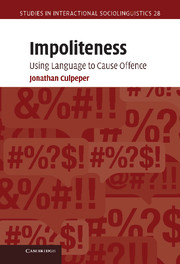Book contents
- Frontmatter
- Contents
- List of figures and tables
- Preface
- Introducing impoliteness
- 1 Understanding impoliteness I: Face and social norms
- 2 Understanding impoliteness II: Intentionality and emotions
- 3 Impoliteness metadiscourse
- 4 Conventionalised formulaic impoliteness and its intensification
- 5 Non-conventionalised impoliteness: Implicational impoliteness
- 6 Impoliteness events: Co-texts and contexts
- 7 Impoliteness events: Functions
- 8 Conclusions
- Notes
- References
- Index
5 - Non-conventionalised impoliteness: Implicational impoliteness
Published online by Cambridge University Press: 16 May 2011
- Frontmatter
- Contents
- List of figures and tables
- Preface
- Introducing impoliteness
- 1 Understanding impoliteness I: Face and social norms
- 2 Understanding impoliteness II: Intentionality and emotions
- 3 Impoliteness metadiscourse
- 4 Conventionalised formulaic impoliteness and its intensification
- 5 Non-conventionalised impoliteness: Implicational impoliteness
- 6 Impoliteness events: Co-texts and contexts
- 7 Impoliteness events: Functions
- 8 Conclusions
- Notes
- References
- Index
Summary
Introduction
Needless to say, many impoliteness events do not involve conventionalised impoliteness formulae at all. Fifty-nine of my 100 reported impoliteness events did not involve conventional impoliteness formulae. Instead, informants interpreted what was said (or done) or not said (or done) in a particular context as impolite, despite the fact that what was said (or done) was not ‘pre-loaded’ for impoliteness. In this chapter, I propose a classification for what I will call implicational impoliteness, derived from analyses of how impoliteness was implied/inferred in my data, both my diary report data and other data sources. This chapter focuses on particular behaviours as triggers for impoliteness attributions in impoliteness events. My use of the term behaviour refers to behaviours in their multimodal fullness. It is more difficult to specify where ‘a behaviour’ in interaction begins and where it ends. Typically, their upper limit is that they never exceed one conversational turn; their lower limit is that they must consist of some communicative material, be it as little as a single word or gesture; their norm is that they contain one or two clauses (which can be reduced) or gestures; their cohesive principle is that all parts must contribute to the same pragmatic strategy or move. Of course, in interpreting these behaviours I will need to bring in the broader context.
- Type
- Chapter
- Information
- ImpolitenessUsing Language to Cause Offence, pp. 155 - 194Publisher: Cambridge University PressPrint publication year: 2011
- 2
- Cited by



